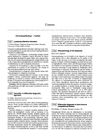 February 2023 in “Archives of Dermatological Research”
February 2023 in “Archives of Dermatological Research” Laser treatment, especially when combined with other therapies, is effective for hair regrowth in alopecia areata.
 1 citations,
January 2022 in “Health”
1 citations,
January 2022 in “Health” COVID-19 has widely affected health, various industries, and the economy, but also led to more remote work and less pollution.
 1 citations,
May 2022 in “IntechOpen eBooks”
1 citations,
May 2022 in “IntechOpen eBooks” Obesity leads to physical, metabolic, reproductive issues, higher healthcare costs, and mental health problems.
 5 citations,
May 2019 in “Cureus”
5 citations,
May 2019 in “Cureus” Taking biotin supplements can cause incorrect thyroid test results, leading to wrong diagnoses.
 23 citations,
August 2018 in “Biochimica and biophysica acta. Molecular and cell biology of lipids”
23 citations,
August 2018 in “Biochimica and biophysica acta. Molecular and cell biology of lipids” Different sPLA2 enzymes affect immunity, skin and hair health, reproduction, and may be potential targets for therapy.
129 citations,
July 2019 in “Stem Cell Research & Therapy” Epidermal stem cells help heal severe skin wounds and have potential for medical treatments.
14 citations,
January 2020 in “Women's health reports” Iron deficiency in menstruating women causes many health issues beyond anemia and needs early detection and treatment.
1 citations,
July 2022 in “Frontiers in Pharmacology” Dutasteride may help protect neurons and reduce inflammation in Parkinson's disease.
 September 1997 in “Journal of The European Academy of Dermatology and Venereology”
September 1997 in “Journal of The European Academy of Dermatology and Venereology” The document concludes that corticosteroids effectively treat vasculitis allergica in over 90% of cases, with long-term kidney issues being the main adverse outcome.
317 citations,
April 2018 in “Journal of steroid biochemistry and molecular biology/The Journal of steroid biochemistry and molecular biology” PCOS is a complex condition in women that can lead to health issues, and lifestyle changes are the best management approach.
 February 2012 in “Australasian Journal of Dermatology”
February 2012 in “Australasian Journal of Dermatology” Some moles can disappear naturally, maintenance therapy for Stage 1 mycosis fungoides may not be necessary, allergic skin reactions in children are rising, weekly methotrexate for psoriasis is more effective than daily, long-term finasteride use improves hair growth with few side effects, and petrolatum improves UV therapy for psoriasis.
 24 citations,
July 2011 in “PubMed”
24 citations,
July 2011 in “PubMed” Thyroid hormones affect skin texture, hair and nail growth, and can cause skin diseases related to thyroid problems.
 January 2024 in “International journal of homoeopathic sciences”
January 2024 in “International journal of homoeopathic sciences” Homeopathic treatments can effectively manage hair loss and improve well-being.
 1 citations,
January 2010 in “Serbian Journal of Dermatology and Venereology”
1 citations,
January 2010 in “Serbian Journal of Dermatology and Venereology” The document concludes that effective acne treatment requires a personalized combination of therapies and long-term commitment, with retinoids being important for maintenance.
10 citations,
March 2021 in “Annals of palliative medicine” PRP shows promise in healing but needs a standardized, safe preparation method.
 489 citations,
November 2021 in “Signal Transduction and Targeted Therapy”
489 citations,
November 2021 in “Signal Transduction and Targeted Therapy” The JAK/STAT pathway is important in cell processes and disease, and JAK inhibitors are promising for treating related conditions.
 17 citations,
March 2018 in “Pediatric dermatology”
17 citations,
March 2018 in “Pediatric dermatology” Hydroxychloroquine may help treat alopecia areata in children.
 33 citations,
January 2011 in “Elsevier eBooks”
33 citations,
January 2011 in “Elsevier eBooks” Systemic Lupus Erythematosus has varied symptoms and is hard to diagnose, affecting many body parts and requiring careful clinical judgment.
 November 2017 in “Research Journal of Health Sciences”
November 2017 in “Research Journal of Health Sciences” Skin infections and eczema were most common in all ages, acne in teens and young adults, and nutritional skin problems and infestations in children.
 33 citations,
August 2006 in “Journal der Deutschen Dermatologischen Gesellschaft”
33 citations,
August 2006 in “Journal der Deutschen Dermatologischen Gesellschaft” Pregnancy can cause specific skin conditions that need correct diagnosis and treatment to protect both mother and baby.
2 citations,
February 2024 in “Toxins” Bee venom can help stem cells promote hair growth.
 January 2015 in “Springer eBooks”
January 2015 in “Springer eBooks” Hair health is influenced by genetics, aging, and environmental factors, with proper care needed to maintain it.
 October 2024 in “Journal of the Endocrine Society”
October 2024 in “Journal of the Endocrine Society” Post-finasteride syndrome can cause lasting sexual, physical, and mental health issues with limited treatment options.
 January 2022 in “Clinical dermatology open access journal”
January 2022 in “Clinical dermatology open access journal” Early-stage Alopecia Areata was effectively treated in less than six months.
 June 2020 in “Journal of Investigative Dermatology”
June 2020 in “Journal of Investigative Dermatology” The technique effectively shows how human skin and hair cells form into ball-like structures.
 3 citations,
June 2023 in “MedComm”
3 citations,
June 2023 in “MedComm” Stem cells and their exosomes show promise for repairing tissues and healing wounds when delivered effectively, but more research is needed on their tracking and optimal use.
 11 citations,
July 2014 in “American Journal of Clinical Dermatology”
11 citations,
July 2014 in “American Journal of Clinical Dermatology” People with vitiligo may have a higher rate of Helicobacter pylori infection, but the infection's severity doesn't affect how severe the vitiligo is.
 13 citations,
July 2019 in “Toxicology research”
13 citations,
July 2019 in “Toxicology research” Ethanamizuril is safe for rats at 20 mg/kg feed, but higher doses cause hair loss, organ changes, and liver, kidney, and lung damage.
 27 citations,
September 2018 in “Skin appendage disorders”
27 citations,
September 2018 in “Skin appendage disorders” Hair transplantation may work for some types of scarring alopecia, but results vary and more research is needed.
 January 2018 in “Springer eBooks”
January 2018 in “Springer eBooks” Terbinafine is the most effective medicine for fungal nail infections, especially for diabetics and those with weak immune systems.























